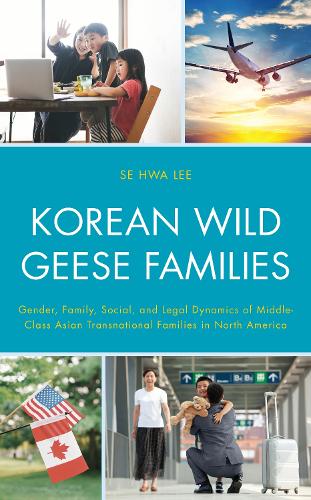
Korean Wild Geese Families: Gender, Family, Social, and Legal Dynamics of Middle-Class Asian Transnational Families in North America
(Hardback)
Publishing Details
Korean Wild Geese Families: Gender, Family, Social, and Legal Dynamics of Middle-Class Asian Transnational Families in North America
By (Author) Se Hwa Lee
Bloomsbury Publishing PLC
Lexington Books
18th May 2021
United States
Classifications
Professional and Scholarly
Non Fiction
Social and cultural history
Migration, immigration and emigration
Sociology: family, kinship and relationships
973.04957
Physical Properties
Hardback
270
Width 164mm, Height 227mm, Spine 23mm
603g
Description
Who are wild geese families They are middle-class Korean transnational families whose mothers and children migrate abroad for childrens education while fathers remain in Korea and economically support their families. While their transnational separation is initiated as a family strategy, it unexpectedly leads to substantial transformations in their lives and relationships.
Korean Wild Geese Families explores the experiences of Korean wild geese families in North America, focusing on their gender, family, social, and legal dynamics throughout transnational separation: before separation, during separation, and after reunification. Se Hwa Lee discusses the themes of (1) changes in wild geese parents relative gender statuses, housework patterns, and spousal relationships; (2) changes in mothering/fathering practices and intergenerational relationships; and (3) wild geese families settlement and integration in the host societies and re-adaptation to Korea after family reunification.
To further the discussion, Se Hwa Lee includes interviews with mothers in both the United States and Canada, as well as fathers in Korea, so that she compares the effects of immigration policies between the two countries and presents gender-balanced explanations. The author sheds light on Asian documented immigrants hardships and different degrees of empowerment and incorporation in the host societies by the type of legal status.
Reviews
Se Hwa Lee uniquely examines how transnationally split middle class couples negotiate womens power and their relationshipbefore separation, while mothers and children live in North America, and after reunification in Korea. The analysis reveals a complex range of challenges and solutions. Migration transforms wives into single and often full-time mothers, as well as women of color in a new country. Their success varies with the effective use of available resources including legal status, employment, additional education, and ethnic community institutions. Meanwhile, fathers downsize living expenses to support their family abroad while also endeavoring to stay emotionally connected with their children and spouses by adopting a new version of fathering that relies on transnational communication and face-to-face encounters.
-- Christine E. Bose, University at Albany, SUNYAuthor Bio
Se Hwa Lee is visiting scholar and research scientist at the University at Albany, State University of New York.
